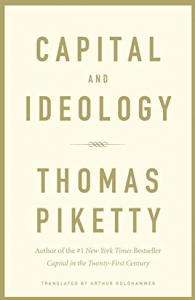Capital and Ideology by Thomas Piketty is going to be published in March 2020 (it was published in French in September 2019) but you can get a good overview and summary of the main points by watching Thomas Piketty’s talk about it at LSE in London in February 2020 (he studied at LSE). Speed reading tip: whenever a book is not published yet, search online for talks or video presentations of that book.
Thomas Piketty, the ‘rock star’ of economics, suggests that Capital and Ideology is much better than his previous bestselling book (2.5 million copies) Capital in the Twenty-First Century and it offers lessons from the history as the struggle of ideologies and the quest of justice in inequality. In his previous book, he suggests a historical mechanism of why inequality increases over time: R>G ie return is greater than growth, therefore wealth grows faster than income resulting in more inequality. In Capital and Ideology, he argues that inequality is a moral and illegitimate issue and asks if inequality isn’t justified, why not change it. “Every human society must justify its inequalities; unless reasons for them are found, the whole political and social edifice stands in danger of collapse.” he writes and continues “A just society organises socioeconomic relations, property rights and the distribution of income and wealth in such a way as to allow its least advantaged members to enjoy the highest possible life conditions”.
From our accelerated learning perspective, the most interesting aspect is his take on education which is key for any national growth. We believe that speed reading is everyone’s right but unfortunately it is not taught at schools at an early age. Piketty suggests that societal inequality stems from lack of education or highly unequal access to education. Educational equality is the biggest factor in economic development, more than property rights, etc he suggests in Capital and Ideology by Thomas Piketty. (Unfortunately, Thomas Piketty ‘predicts’ that there will be more inequality post-Brexit in the UK.)
The book has four parts. Part One: Inequality Regimes in History, Part Two: Slave and Colonial Societies, Part Three: The Great Transformation of the Twentieth Century, and Part Four: Rethinking the Dimensions of Political Conflict
See the pdf of the slides from Thomas Piketty LSE talk (short version) and long version
Thomas Piketty talks about Capital and Ideology at LSE in London in February 2020
We are now LIVE with LSE alumnus Professor Thomas Piketty and LSE Director Minouche Shafik discussing his new book ‘Capital and Ideology’.
Posted by The London School of Economics and Political Science – LSE on Thursday, February 6, 2020

